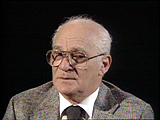Doriane
Kurz
Born 1936
Vienna, Austria

Recalls Bergen-Belsen prisoners hauling wagons of corpses
"I would never believe that a person can survive standing in the outside in the wintertime without clothes for so long." There were wagons...open wagons like, like carts, like the back of a horse and cart, open wagons, that were dragged along without horses. There were people pulling them. And uh they had uh corpses in them. And the corpses were lying in all directions and uh, heaped on top of each other and there were many people who died every night and they didn't make it out to Appell but they were accounted for by being bodies and so after the grownups were marched out the uh there was a squadron of people that pulled this wagon around and uh came into the barracks and took the corpses, and then they would, two of them would take the corpse, one at the feet and one at the hands and they would toss them up to the top of the heap and that uh happened every day. I still have trouble with that.
Ernest
Koenig
Born 1917
Vienna, Austria

Describes reaching the verge of death while in a subcamp of Auschwitz.
I once came in front of a mirror, and I saw what was called a Muselmann. You know what a Muselmann was...somebody who was so emaciated he was about to die. That was the last stage and then people died, and I was struck by what I saw, myself, and outside this place where I saw myself there was a garbage can, and I looked into the garbage can and there was a book and the book contained the text of, of, uh, songs by Schubert and you might know there is one song by Schubert, an Austrian composer, the "Death and the Maiden," and the Death says to the maiden, "Don't be afraid. You are not going to suffer. You will sleep in my arms." And that, uh, encouraged me very much because I said to myself, "Okay, if I have to die, it will be sleeping. You, I don't have to be afraid," and I wasn't afraid, and that was a very deep experience. Shortly thereafter I was so weak that I asked for sick leave. Now you could ask for sick leave...sick leave...I mean you could ask not to go to work for one day but it was very dangerous because then you came to the sick bay and then you went...that we knew at this time, I must have known. I was so weak I stayed in bed and I didn't want to go up. I, I...I was quite indifferent what, to what happened, I couldn't anymore. And this Stanislaw Kubackzek, this Polish officer who had become a Kapo, uh, helped me. In the first place, the Kapo has...had to...had to watch whether his people got one ration, got their food, and he had to watch others that they don't, don't come twice and take food twice, so he allowed me to go twice. I was the first and came the last one. Then he took me in to his Kommando, in his team, and I didn't have to work, so I recovered.
